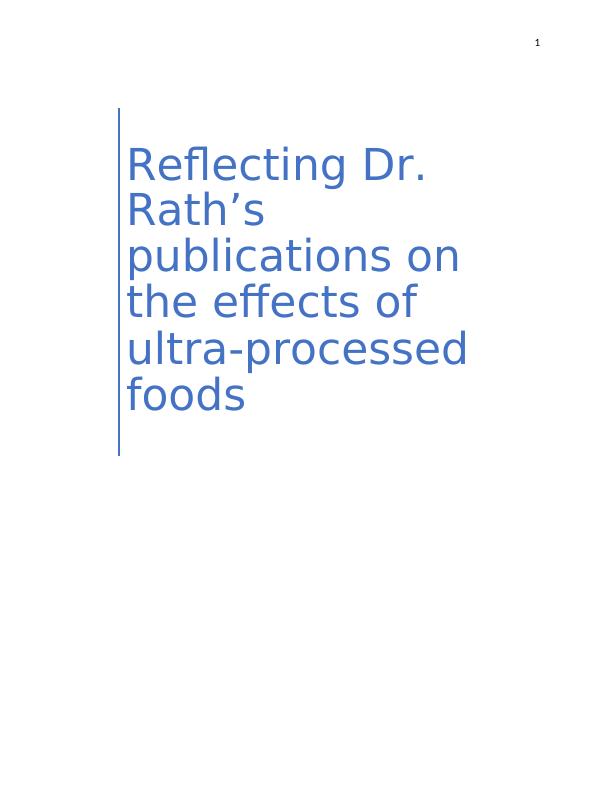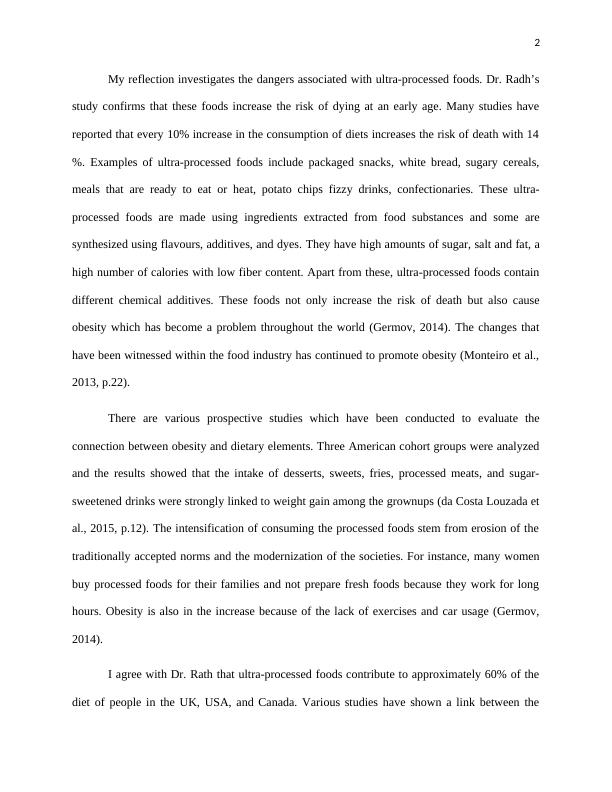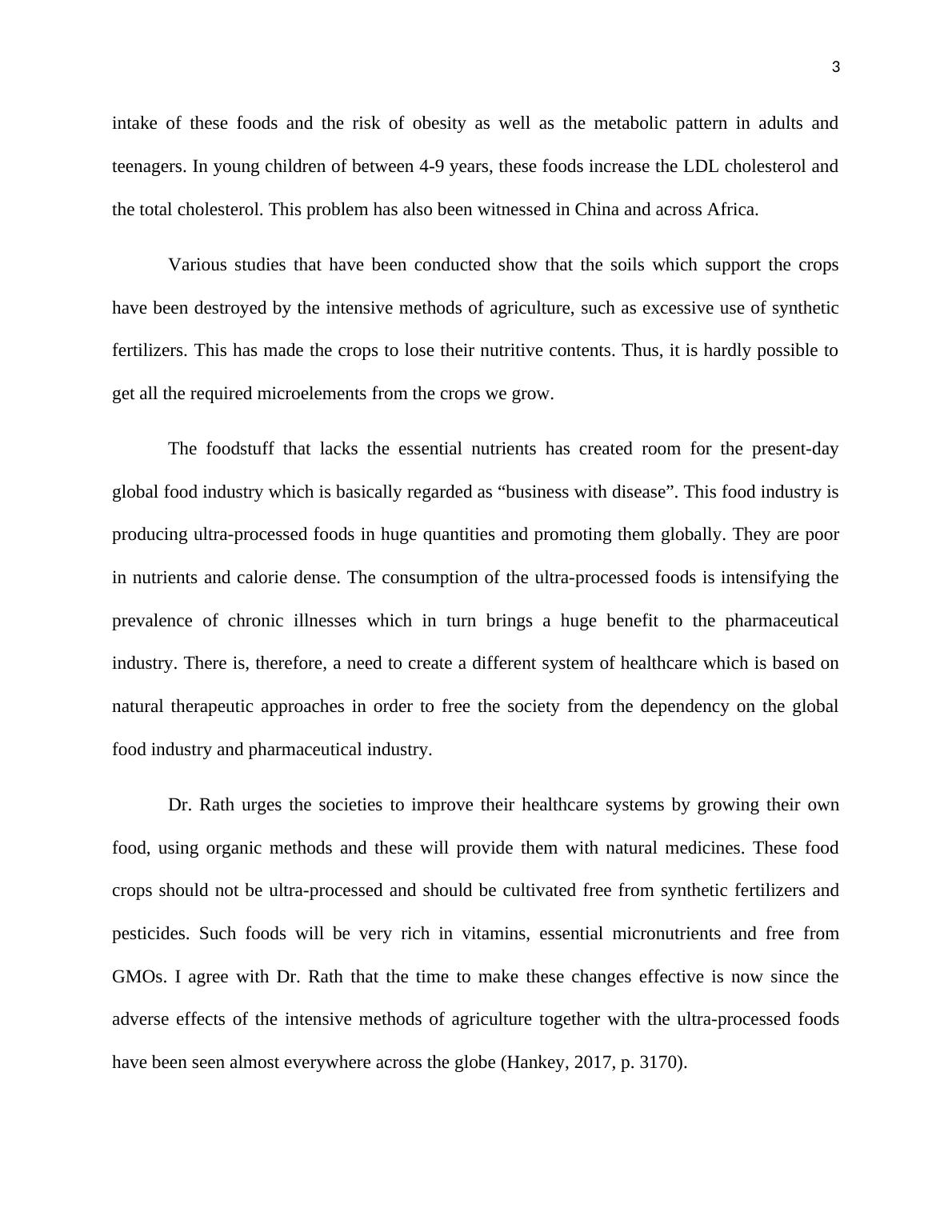Reflecting Dr. Rath’s publications on the effects of ultra-processed foods
Added on 2023-04-20
7 Pages1857 Words384 Views
1
Reflecting Dr.
Rath’s
publications on
the effects of
ultra-processed
foods
Reflecting Dr.
Rath’s
publications on
the effects of
ultra-processed
foods

2
My reflection investigates the dangers associated with ultra-processed foods. Dr. Radh’s
study confirms that these foods increase the risk of dying at an early age. Many studies have
reported that every 10% increase in the consumption of diets increases the risk of death with 14
%. Examples of ultra-processed foods include packaged snacks, white bread, sugary cereals,
meals that are ready to eat or heat, potato chips fizzy drinks, confectionaries. These ultra-
processed foods are made using ingredients extracted from food substances and some are
synthesized using flavours, additives, and dyes. They have high amounts of sugar, salt and fat, a
high number of calories with low fiber content. Apart from these, ultra-processed foods contain
different chemical additives. These foods not only increase the risk of death but also cause
obesity which has become a problem throughout the world (Germov, 2014). The changes that
have been witnessed within the food industry has continued to promote obesity (Monteiro et al.,
2013, p.22).
There are various prospective studies which have been conducted to evaluate the
connection between obesity and dietary elements. Three American cohort groups were analyzed
and the results showed that the intake of desserts, sweets, fries, processed meats, and sugar-
sweetened drinks were strongly linked to weight gain among the grownups (da Costa Louzada et
al., 2015, p.12). The intensification of consuming the processed foods stem from erosion of the
traditionally accepted norms and the modernization of the societies. For instance, many women
buy processed foods for their families and not prepare fresh foods because they work for long
hours. Obesity is also in the increase because of the lack of exercises and car usage (Germov,
2014).
I agree with Dr. Rath that ultra-processed foods contribute to approximately 60% of the
diet of people in the UK, USA, and Canada. Various studies have shown a link between the
My reflection investigates the dangers associated with ultra-processed foods. Dr. Radh’s
study confirms that these foods increase the risk of dying at an early age. Many studies have
reported that every 10% increase in the consumption of diets increases the risk of death with 14
%. Examples of ultra-processed foods include packaged snacks, white bread, sugary cereals,
meals that are ready to eat or heat, potato chips fizzy drinks, confectionaries. These ultra-
processed foods are made using ingredients extracted from food substances and some are
synthesized using flavours, additives, and dyes. They have high amounts of sugar, salt and fat, a
high number of calories with low fiber content. Apart from these, ultra-processed foods contain
different chemical additives. These foods not only increase the risk of death but also cause
obesity which has become a problem throughout the world (Germov, 2014). The changes that
have been witnessed within the food industry has continued to promote obesity (Monteiro et al.,
2013, p.22).
There are various prospective studies which have been conducted to evaluate the
connection between obesity and dietary elements. Three American cohort groups were analyzed
and the results showed that the intake of desserts, sweets, fries, processed meats, and sugar-
sweetened drinks were strongly linked to weight gain among the grownups (da Costa Louzada et
al., 2015, p.12). The intensification of consuming the processed foods stem from erosion of the
traditionally accepted norms and the modernization of the societies. For instance, many women
buy processed foods for their families and not prepare fresh foods because they work for long
hours. Obesity is also in the increase because of the lack of exercises and car usage (Germov,
2014).
I agree with Dr. Rath that ultra-processed foods contribute to approximately 60% of the
diet of people in the UK, USA, and Canada. Various studies have shown a link between the

3
intake of these foods and the risk of obesity as well as the metabolic pattern in adults and
teenagers. In young children of between 4-9 years, these foods increase the LDL cholesterol and
the total cholesterol. This problem has also been witnessed in China and across Africa.
Various studies that have been conducted show that the soils which support the crops
have been destroyed by the intensive methods of agriculture, such as excessive use of synthetic
fertilizers. This has made the crops to lose their nutritive contents. Thus, it is hardly possible to
get all the required microelements from the crops we grow.
The foodstuff that lacks the essential nutrients has created room for the present-day
global food industry which is basically regarded as “business with disease”. This food industry is
producing ultra-processed foods in huge quantities and promoting them globally. They are poor
in nutrients and calorie dense. The consumption of the ultra-processed foods is intensifying the
prevalence of chronic illnesses which in turn brings a huge benefit to the pharmaceutical
industry. There is, therefore, a need to create a different system of healthcare which is based on
natural therapeutic approaches in order to free the society from the dependency on the global
food industry and pharmaceutical industry.
Dr. Rath urges the societies to improve their healthcare systems by growing their own
food, using organic methods and these will provide them with natural medicines. These food
crops should not be ultra-processed and should be cultivated free from synthetic fertilizers and
pesticides. Such foods will be very rich in vitamins, essential micronutrients and free from
GMOs. I agree with Dr. Rath that the time to make these changes effective is now since the
adverse effects of the intensive methods of agriculture together with the ultra-processed foods
have been seen almost everywhere across the globe (Hankey, 2017, p. 3170).
intake of these foods and the risk of obesity as well as the metabolic pattern in adults and
teenagers. In young children of between 4-9 years, these foods increase the LDL cholesterol and
the total cholesterol. This problem has also been witnessed in China and across Africa.
Various studies that have been conducted show that the soils which support the crops
have been destroyed by the intensive methods of agriculture, such as excessive use of synthetic
fertilizers. This has made the crops to lose their nutritive contents. Thus, it is hardly possible to
get all the required microelements from the crops we grow.
The foodstuff that lacks the essential nutrients has created room for the present-day
global food industry which is basically regarded as “business with disease”. This food industry is
producing ultra-processed foods in huge quantities and promoting them globally. They are poor
in nutrients and calorie dense. The consumption of the ultra-processed foods is intensifying the
prevalence of chronic illnesses which in turn brings a huge benefit to the pharmaceutical
industry. There is, therefore, a need to create a different system of healthcare which is based on
natural therapeutic approaches in order to free the society from the dependency on the global
food industry and pharmaceutical industry.
Dr. Rath urges the societies to improve their healthcare systems by growing their own
food, using organic methods and these will provide them with natural medicines. These food
crops should not be ultra-processed and should be cultivated free from synthetic fertilizers and
pesticides. Such foods will be very rich in vitamins, essential micronutrients and free from
GMOs. I agree with Dr. Rath that the time to make these changes effective is now since the
adverse effects of the intensive methods of agriculture together with the ultra-processed foods
have been seen almost everywhere across the globe (Hankey, 2017, p. 3170).

End of preview
Want to access all the pages? Upload your documents or become a member.
Related Documents
Reflecting Dr. Rath’s publications on the effects of ultra-processed foodslg...
|7
|2175
|47
Not all processed food are Unhealthylg...
|10
|598
|55
Short and Long Term Effects of Poor Nutrition on Child Developmentlg...
|8
|2240
|280
Invasion of Hyper-Palatable Food: Problems and Solutionslg...
|4
|562
|299
Problems Associated with High Intake of Sugar and Possible Solutionslg...
|10
|1774
|77
Effects of Cystic Fibrosis and Huntington's Diseaselg...
|12
|2579
|52
